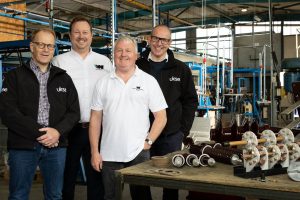Titan upbeat despite threatened mining tax

CONCERNS about a new mining tax in Australia have taken some of the gloss off a strong set of results by steel wheel manufacturer Titan Europe.
The company, whose UK operation is in Kidderminster, announced interim profits of £3.5m in the first half of 2010, which compared to a loss of almost £4m in the same period last year.
Chief executive, Mike Akers, said that while the firm was making no forecasts for the second half of the year, it had been encouraged by conditions in three of its key markets – agriculture, construction and mining.
The company is intent on expanding its global operations – the UK operation accounting for just 10% of the group’s overall business – and is looking to develop a site in Australia for the manufacture of the giant wheels used by the heavy plant machinery in mining operations.
However, the group’s share price was hit on the news that Australia’s ruling Labour Party was set to continue in government, raising concerns that the manifesto promise of a new mining tax would be carried through.
The 40% Resource Super Profits Tax will hit big miners such as BHP Billiton, Rio Tinto and Xstrata.
BHP Billiton chief executive Marius Kloppers has said that if the tax is implemented then it will seriously threaten Australia’s competitiveness, jeopardise future investments and adversely affect future living standards in the country.
Click here for more manufacturing stories
The move could also have a knock-on effect to companies working in the mining sector – Titan being a prime example.
Nevertheless, Mr Akers has said the company is pressing on with its growth plans.
Outside of Australia, it is looking to improve its position in emerging markets such as Brazil and China, while a new foundry operation in Spain is benefiting from demand in the high speed rail industry.
It is also hoping that the situation in North America will improve.
“We are still seeing problems in North America but we are not alone in that,” said Mr Akers.
“Long-term we think the situation will improve and so for the time being, we are placing our focus on other markets.
“We are doing well without the contribution from North America and should that market improve, then that would be the cherry on the cake,” he added.
The recession saw the group’s overall volumes fall 47% between 2008 and 2009, prompting a review of the business to make it more efficient.
Despite job losses, Mr Akers said the firm remained well placed to capitalise on growth and would be looking to strengthen its sales teams to make the most of any opportunities which presented themselves.








